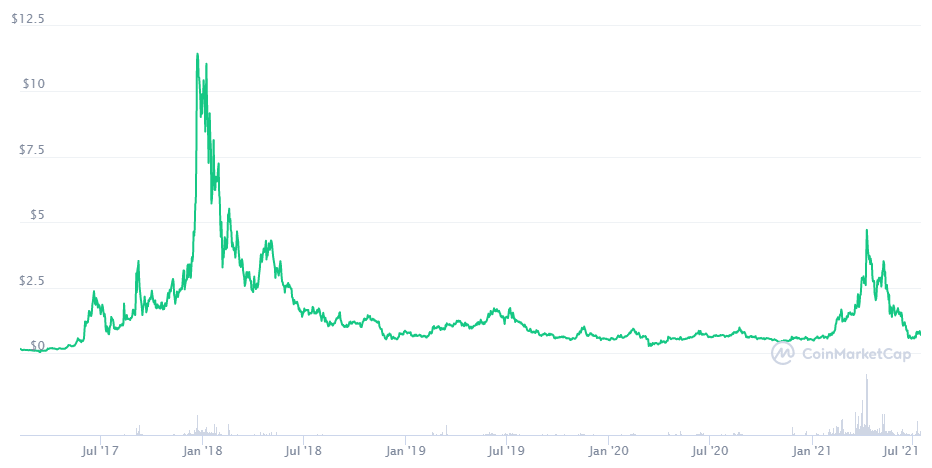DeFi Deep Dive — Komodo, the Blockchain Unifier
7 min readTable of Contents
Komodo is the next step in the DeFi evolution by freeing DeFi products from blockchain-specific ecosystems.
As the blockchain space matures, we are moving past individual blockchains that are competing for the piece of the DeFi pie as self-contained ecosystems. Instead, the future of blockchain-based products and platforms is clearly one in which each blockchain can interact with others. This forms an experience that is seamless for the end-user.
After many milestones, re-brandings, and transitions, Komodo is positioning itself as the major player in this future. Those businesses who need to create a smart contract blockchain to deploy their DeFi solutions can turn to Komodo. It’s language-agnostic, smart contract, multi-chain platform can create scalable and customizable blockchains.
This is on top of Komodo’s value as a privacy-oriented cryptocurrency (KMD) and a multi-coin crypto wallet. Let’s explore how Komodo achieved this flexibility and what is in store for its future.
Komodo owes its existence to James Lee
Komodo’s history is linked to the efforts of pseudonymous James Lee. He is popularly known on the internet as ‘JL777.’ He is a firm believer in safeguarding one’s identity, hence Komodo is so privacy-focused. JL777 entered the blockchain scene in 2013, inspired by BTC’s potential as a “freedom enabling tool.”
His first project was the NXT platform. This was a nearly decentralized crypto exchange or peer-to-peer Command Line Wallet-based atomic swap. However, because other NXT developers disagreed on making it backward compatible, and significantly raised platform fees, Lee decided to leave the project in late 2014. After that, he became the core developer of the BitcoinDark (BTCD) project, effectively Komodo’s precursor.
Komodo as BitcoinDark evolution

BTCD was a step-up from NXT, in terms of its privacy focus, lack of fee hikes, and compatibility. However, during the development, Lee came to the conclusion that blockchain interoperability with third-party protocols will be the stumbling block that needs to become a priority. In other words, one’s assets should flow freely across blockchains as if they reside on a single blockchain.
Lee expressed this belief in his Declaration of Independence on Bitcointalk forum in February 2016. Soon after, in September 2016, Lee launched the Komodo project. He brought with him the BTCD team and swapping BTCD coins for KMD.
Komodo’s Initial Coin Offering (ICO) launched over a month later, in October, and ended on November 20, 2016. It raised about $2 million.
Komodo reflects Lee’s philosophy in three key aspects:
- Exchange of crypto assets should be peer-to-peer (P2P).
- It should be easily executed cross-chain.
- It should be easily executed cross-protocol.
Komodo and developers
After pioneering native web-browser atomic swaps in 2019, Komodo is now a third-generation DEX, with AtomicDEX as its main GUI product.
Komodo exerted a major influence on other developers to create multi-chain platforms for developing dApp-specific blockchains. The most popular such projects are Polkadot and Cosmos Network.
Komodo’s CTO, Kadan Stadelman, says that cross-chain compatibility became highly sought during ETH’s skyrocketing gas fees during the first half of 2021.
“AtomicDEX is gaining attention because it supports dozens of blockchain ecosystems natively — no proxy tokens required. For example, let’s say you want to have a decentralized bridge between ERC-20 tokens and BEP-20 tokens, AtomicDEX offers that not only to end users but also to developers.”
With the recent rollout of the Komodo AtomicDEX API, the open-source Komodo platform is ready to deploy DEXs, multi-coin wallets, and other DeFi solutions.
These are both cross-chain and cross-protocol compatible. Down the line, the Komodo team plans to add multiple blockchains. These include Polygon and Avalanche, given the fact that Komodo is compatible with 99% of cryptocurrencies.
This includes the privacy-fortified Pirate Chain (ARRR), which now has the first-ever fully private atomic swap.
Komodo tech explained
Komodo is best understood as Zcash 2.0 or a hard fork from Zcash. This privacy cryptocurrency draws its code from BTC but adds a layer of enhanced privacy features so that “crypto” in cryptocurrency becomes meaningful once again. Adding to Zcash, Komodo represents an evolution defined by the following concepts:
Delayed proof-of-work
Unlike BTC’s PoW, Delayed Proof-of-Work (d-PoW) is not a consensus algorithm per se. Instead, it acts as a security layer on top of traditional PoW by using the blockchain’s hashpower to add security features.
The first among them is zero-knowledge privacy. D-PoW creates an image of its blockchain within intervals of 10 minutes, storing it — through the process of notarization — into the BTC network.
With this backup of the whole Komodo saved, Komodo’s nodes generate a block hash from the d-PoW notarized blockchain to the platform’s ledger. Notary nodes then write the BTC’s block data to other chains on Komodo’s platform. Therefore, if a system failure occurs, all block data can be rapidly recovered, providing an extra layer of security against a 51% attack.
In other words, every chain linked to the KMD chain gains powerful protection from the BTC network at a fraction of the cost. Although d-PoW itself is permissionless, Notary Nodes are permissioned in the sense that one must get in touch with the Komodo Development Team.
SuperNET
SuperNET is an open-source, decentralized framework for creating all the necessary tools to take down fiat money and replace it with DeFi. One of its most popular products is Peerchains and BarterDEX atomic swap. Such projects serve as reference applications, uniting DeFi protocols and preventing fragmentation.
After all, it doesn’t make much sense to create new DeFi protocols over and over again, thus diluting users’ attention. Accordingly, given its open-source pedigree, SuperNET allows third parties to use the developed dApps like BarterDEX.
Within the SuperNET framework, Iguana serves as a multi-coin wallet unifying the platform’s codebase. Lee explained Iguana’s relationship to Komodo as:
“Think of it as a wide-ranging toolkit that has code to do pretty much anything related to crypto, and even some things that are just OS independent ways of dealing with large real-time datasets and networking.”
One of Iguana’s functions is to facilitate Komodo’s notary nodes.
Antara Framework
Antara Framework is at the core of Komodo’s appeal, as a toolkit for end-to-end, scalable blockchain development. Antara’s first layer to make this happen is Smart Chains. They are modular and customizable chains that provide:
- Its own block rewards
- Block time
- Hashing algorithm
- Own consensus rules
- Pre-mine supply
- Privacy settings
- The size and frequency of block rewards’ reductions
Smart Chains also have an integrated Antara Module library, with each module becoming active based on the needs of the project. Some of these modules include trustless oracles, tokenization, stablecoins, instant micropayments methods, and others.
One of the more prominent adopters of Antara was the HempCoin (THC) in 2019 for its hemp tracing needs, in order to take advantage of Komodo’s feeless approach for taking care of on-chain transactions.
An example of these technologies coming together happened this March, with DogeDEX. Stadelman, says that other projects are in the works thanks to Komodo’s unmatched flexibility as a blockchain-building platform.
“Basically, any crypto community can use our technology to launch their own decentralized exchange. We’re also working with Gleec Coin to create the first ever decentralized blockchain migration and to launch their own branded DEX called GleecDEX.”
Komodo (KMD) token
With the current market cap of $87.8 million, Komodo’s native KMD token is trading at $0.69 during press time. Its ATH price occurred on December 22, 2017, at $11.44.
At KMD’s second peak in 2021, within a three-month period, from April 8 to July 12, KMD’s price dropped by 83%. You can trade with KMD tokens on all major crypto exchanges: Binance, HitBTC, Huobi Global, Bittrex, WazirX, and others.
90 million of the total 200 million KMD went to the initial ICO investors in November 2016. Komodo development team holds 10 million KMD for funding and marketing purposes. If you hold a minimum of 10 KMD, you are eligible to earn a passive 5% annual payment.
This is why Komodo has been a popular choice of cryptocurrency mining pool, in which rewards are shared equally between the miner participants.
As far as the wallet of choice goes, Komodo currently supports 13 KMD wallets, with AtomicDEX serving as both a multi-coin wallet and a decentralized exchange, making it an ultra-convenient one-stop crypto station.
Komodo represents the original cryptocurrency vision
Komodo revitalizes the vision of privacy by making atomic swaps a reality — exchanging cryptocurrencies without centralized mediators as busybodies.
Given the fact that all major central banks across the world are about to implement Central Bank Digital Currencies (CBDCs), it is safe to say that the future is one of total financial surveillance.
With the power of CBDCs comes the power of deplatforming for arbitrary reasons. Komodo counters that future with one that respects both privacy and security.
It offers a comprehensive blockchain-building platform with near 100% compatibility with every cryptocurrency in existence. In this light, Komodo’s demand will likely start to snowball.
The post DeFi Deep Dive — Komodo, the Blockchain Unifier appeared first on BeInCrypto.







